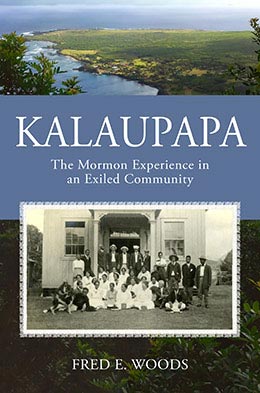Acknowledgments
Fred E. Woods, "Acknowledgements," in Kalaupapa: The Mormon Experience in an Exiled Community, Fred E. Woods (Religious Studies Center, Brigham Young University; Salt Lake City: Deseret Book, 2017), vii-x.
It has been said that the sin of ingratitude is a crime more despicable than revenge. There are many to thank who have assisted with this book. This work is based on hundreds of primary sources and scores of oral history interviews I have been gathering for over a decade, and it has been made possible through the assistance of numerous individuals and several institutions. I first and foremost wish to express gratitude to the College of Religious Education at Brigham Young University for its financial support and resources rendered via transcriptions made from oral history interviews transcribed by the reliable staff of the BYU Faculty Support Center for Religious Education.
I wish to express deep gratitude for the competent teams employed at the L. Tom Perry Special Collections in the Harold B. Lee Library at Brigham Young University in Provo, Utah; the Church History Library of The Church of Jesus Christ of Latter-day Saints in Salt Lake City; the Hawai‘i State Archives in Honolulu; the Damien Center in Leuven, Belgium; the Archive of the Archbishop of Mechelen in Brussels, Belgium; the Archive at St. Anthony Convent and Motherhouse, Sisters of St. Francis in Syracuse, New York; the Archives of the Congregation of the Sacred Hearts in Honolulu; the Archives of the Congregation of the Sacred Hearts in Leuven, Belgium; the University Archives and Records Center at the University of Pennsylvania in Philadelphia; the Hawaiian Mission Children’s Society Library in Honolulu; the Bishop Museum Archives in Honolulu; the Joseph F. Smith Library Archives and Special Collections at Brigham Young University–Hawaii in Lā‘ie; and the Kalaupapa National Park. These institutions have all been very helpful.
I wish to thank Brenda Jeppson, who helped transcribe a number of Kalaupapa records housed at the Joseph F. Smith Library at BYU–Hawaii, as well as a number of BYU students who have provided aid for this project as they labored with me as research assistants: Tanya Gale, Heidi Hanson, McKay Court, and others. I am also grateful for the editorial assistance of the following: Don E. Norton, emeritus BYU English professor; Beverly Yellowhorse; Alohalani Housman, professor at BYU–Hawaii; Devan Jensen; Kimball Gardner; and especially my wife, JoAnna Woods, an independent writer, who carefully read the entire manuscript and made some significant changes throughout this work. BYU students Eric Soza and Tyler Workman have provided valuable assistance with source checking. Further, I appreciate Thomas A. Wayment and BYU Religious Studies Center staff members Brent Nordgren and Madison Swapp for their assistance with design, layout, and photographs. I am sincerely grateful for emeritus BYU English professor Jay Fox, who carefully perused through this work, as well as Martin L. Andersen, Riley Moffat, and Ethan Vincent, who read all or part of the manuscript.
Assistance has also been graciously provided by Brittany Chapman Nash, archivist at the Church History Library, and Jason Achiu, research specialist at the Hawai‘i State Archives, who translated a number of Hawaiian texts and went the extra mile to render support. The same is true of T. Scott Williams, former curator, and Ka‘ohulani McGuire, cultural anthropologist, at the Kalaupapa National Historic Park. In addition, Joseph-James Ahern, archivist at the University Archives and Records Center at the University of Pennsylvania in Philadelphia promptly supplied needed materials from the Benjamin Sharp Papers. Further, Matt Kester, former archivist at the Joseph F. Smith Archives and Special Collections at BYU–Hawaii, provided many images. Jean Huysmans kindly traveled with me through Belgium to visit archives and rendered indispensable aid. Archivists Ruben Boon and Patrik Jaspers at the Damien Center in Leuven were also very helpful.
In addition, I extend sincere thanks to the patients at Kalaupapa and Hale Mōhalu, who trusted me with intimate interviews and who also became dear friends. A number of them have passed away during the writing of this manuscript. I am grateful to scores of others who were willing to be involved with oral history interviews, enlightening conversations, or who provided reflections of their experiences. Finally, I express deep appreciation to my family, who have been a constant support of my diverse projects.
